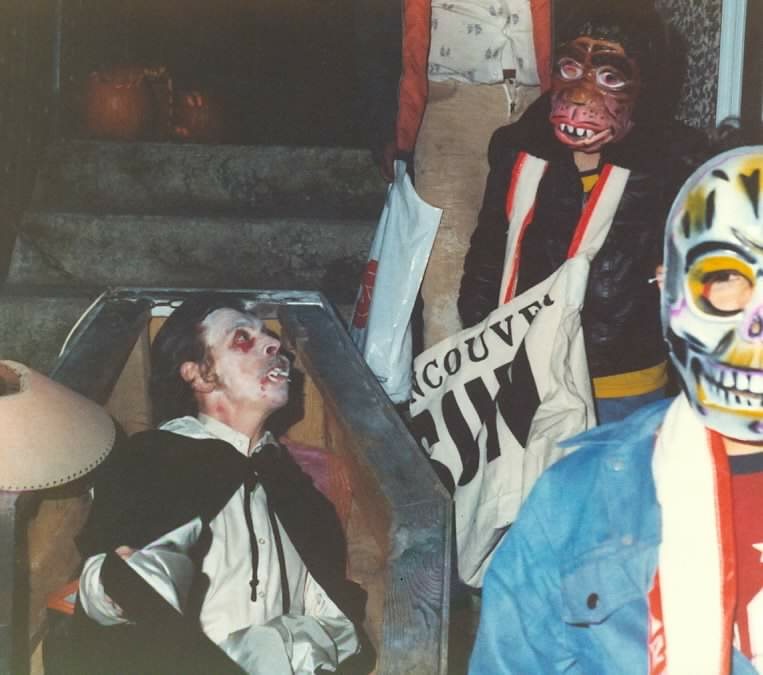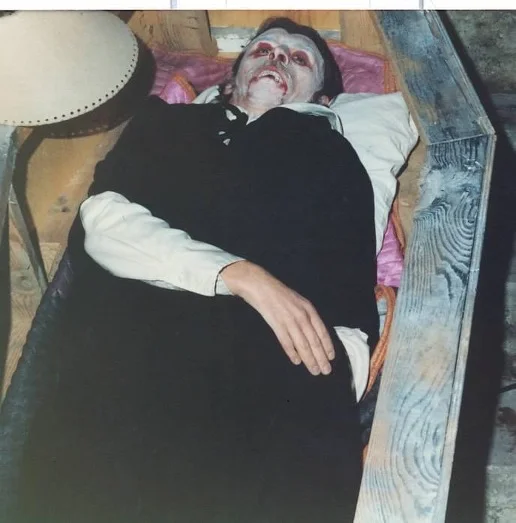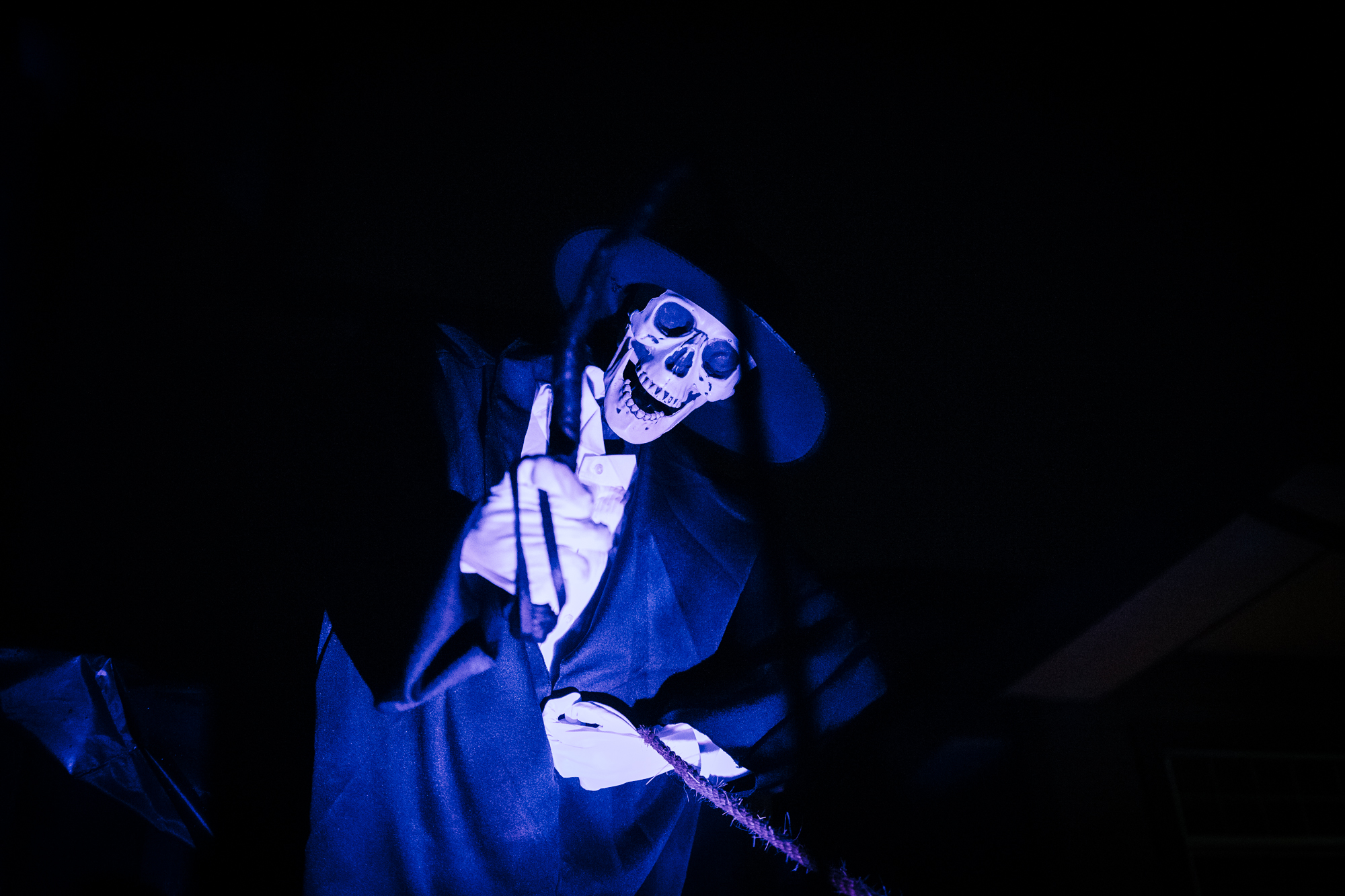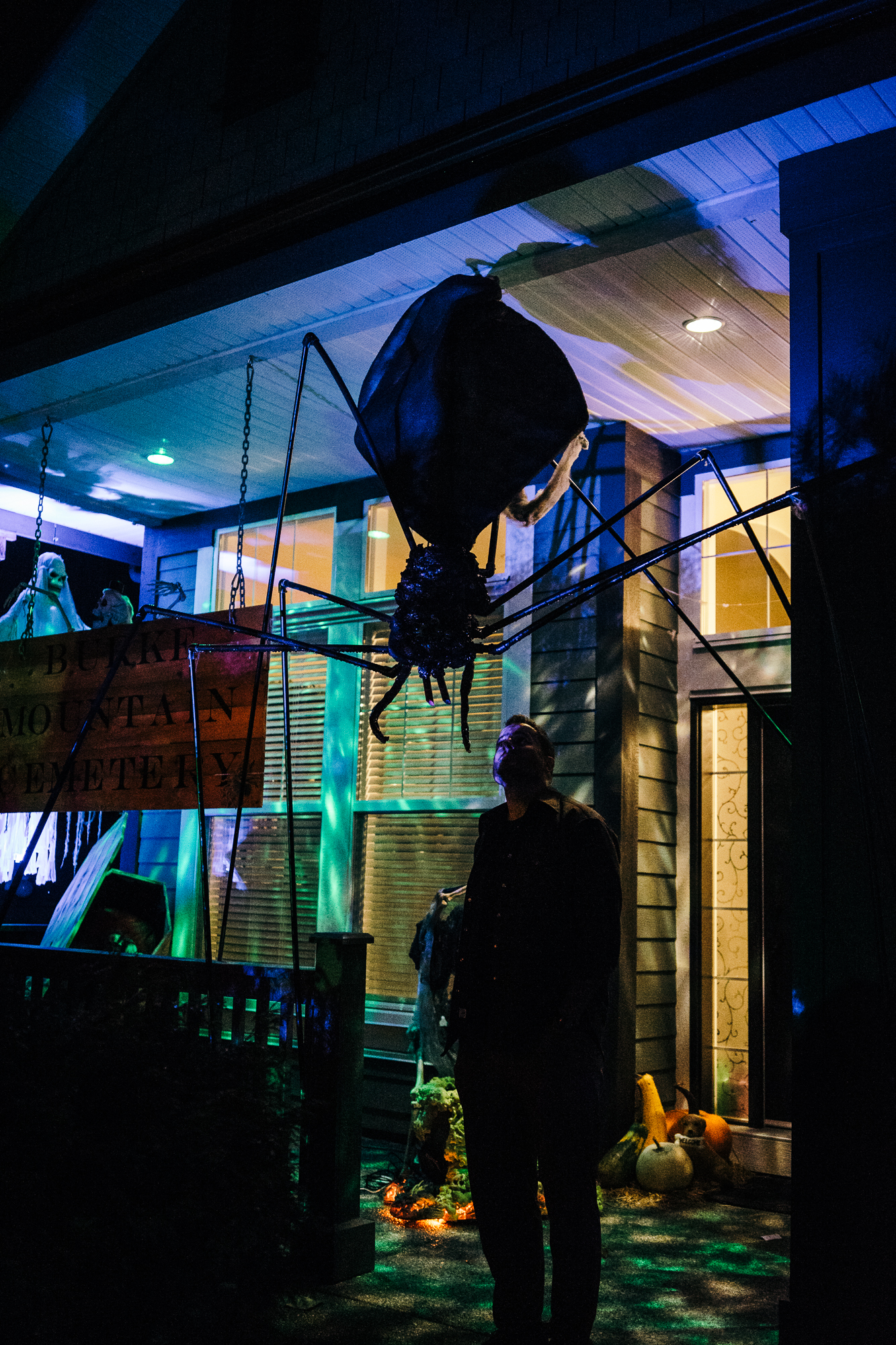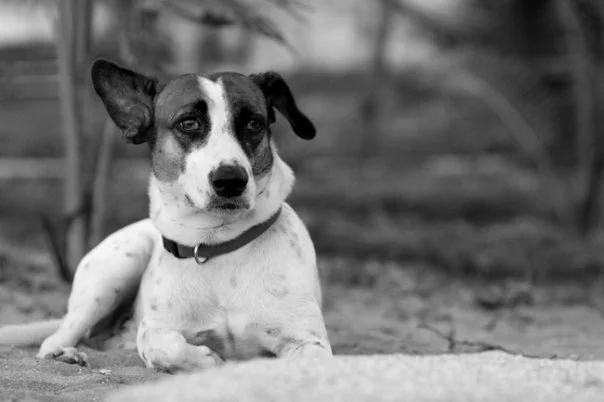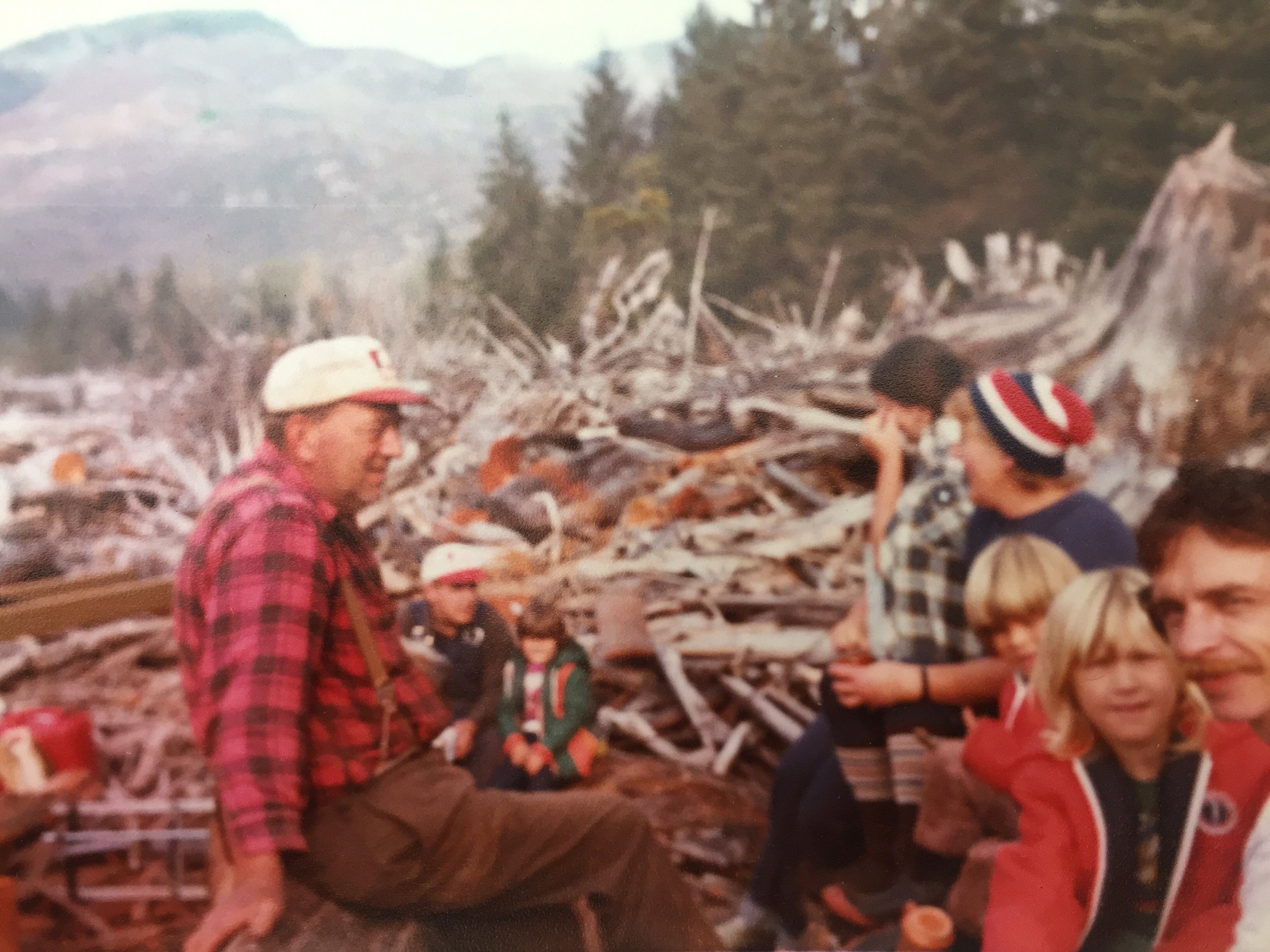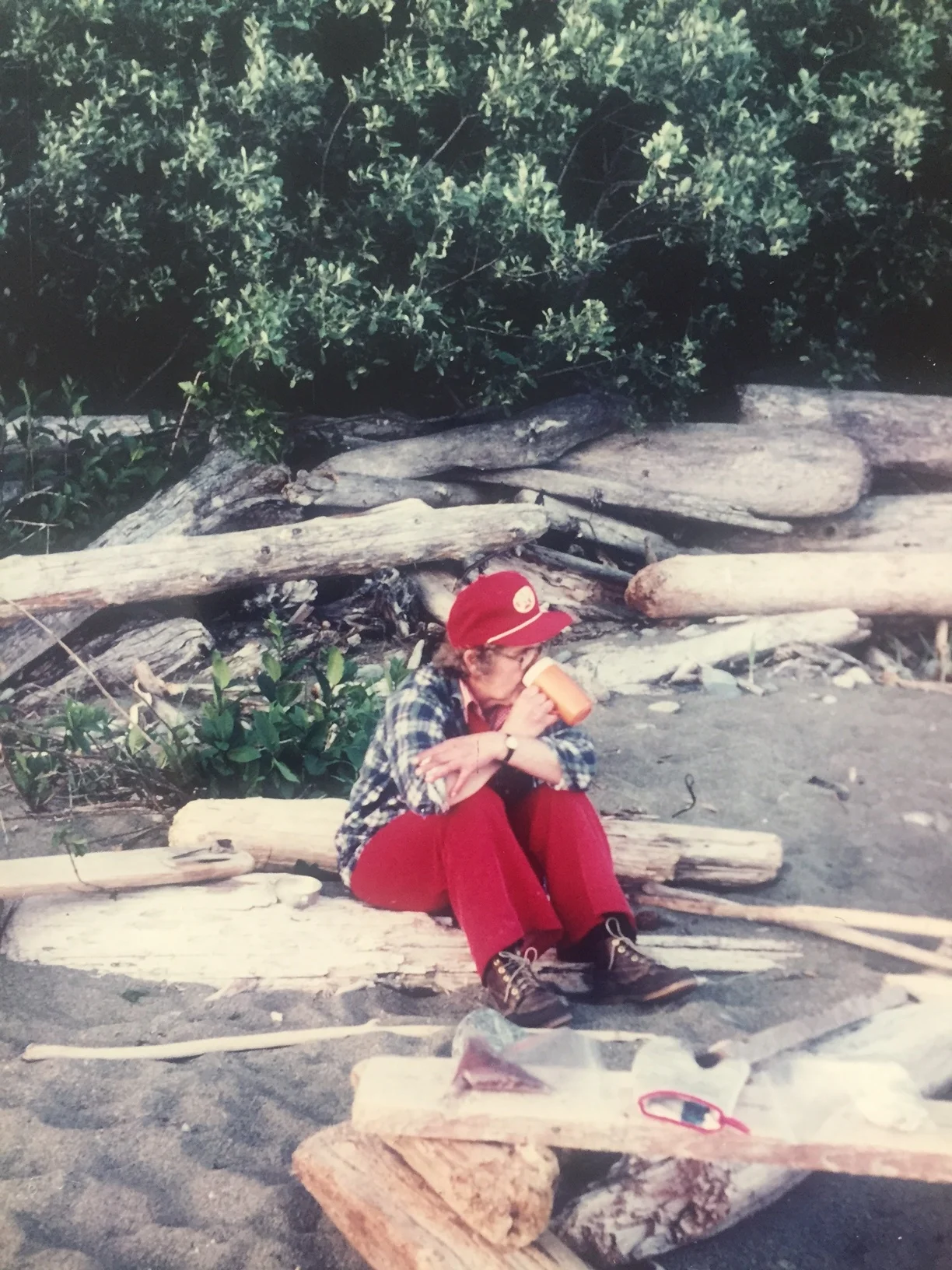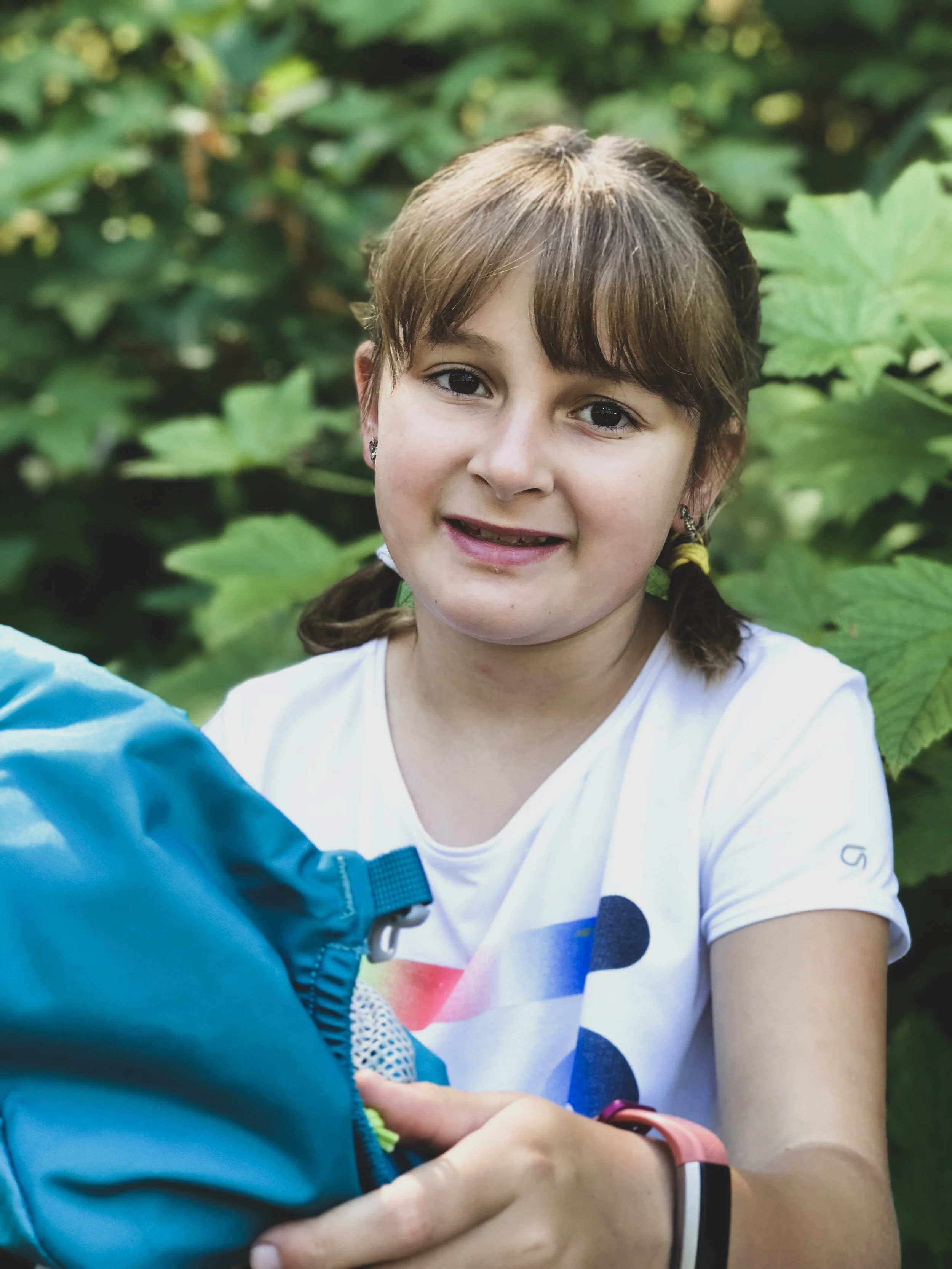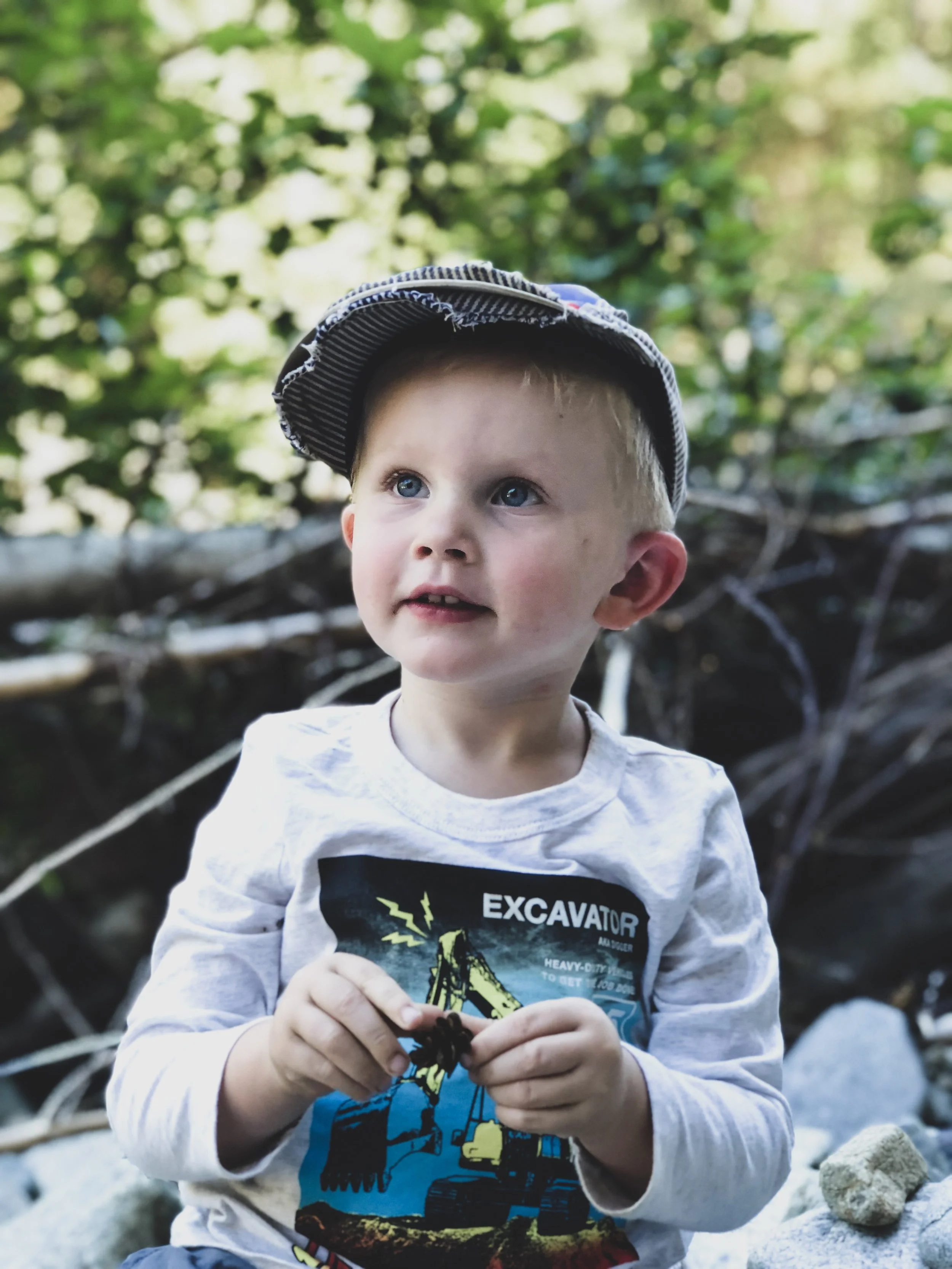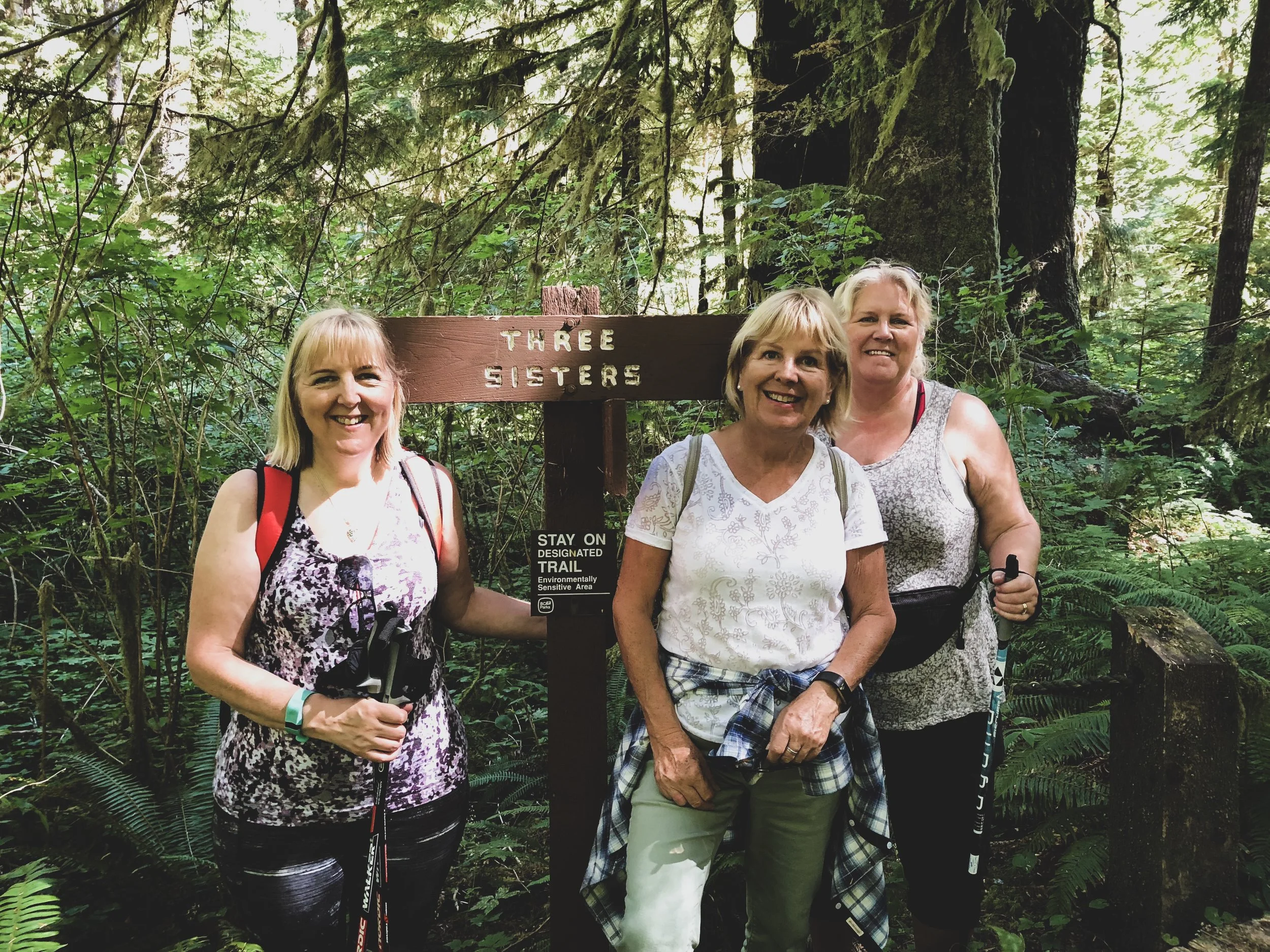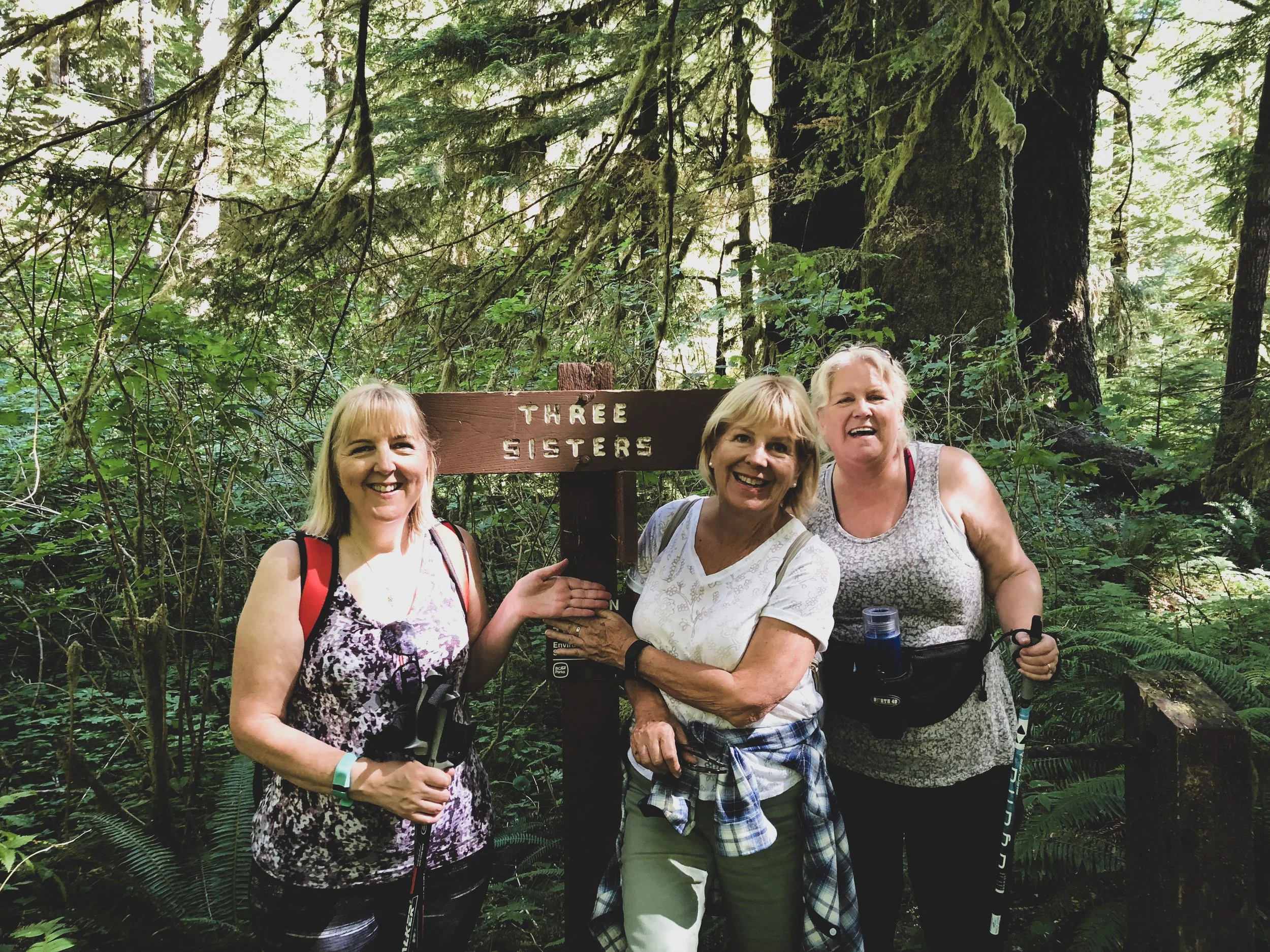
Hereditary Halloween
My brother has always been extremely talented but seeing the streams of cars and kids flow past his house last night, even before the lights were on, really brought that fact home for me.
My brother has always been extremely talented but seeing the streams of cars and kids flow past his house last night, even before the lights were on, really brought that fact home for me.
Our dad loved Halloween. I remember the elaborate group costumes that he, Mom, and their friends would put together for the Halloween dance in Bamfield. But before we moved to a house that, by it’s nature of being water access only and even more removed from the already remote town, was a deterrent to trick-or-treaters - and before I was born - Dad focused his efforts on terrorizing children who came to his door.
As it’s been told to me, after ringing the doorbell and collecting their candy, the kids would turn to leave and our dad, dressed as Dracula would slowly sit up, opening the lid of a coffin that everyone had thought was just a ghoulish decoration. The kids would scream and run away. Dad loved it.
As I mention, I never got to experience this part of our dad’s Halloween revelry because I wasn’t born yet. But a few years ago my brother started to decorate his house for Halloween. And he didn’t just decorate it, but he began designing and custom building his own props.
Chris has always been creative, and a talented artist. I still cherish a book of poetry that he gave me for Christmas when we were kids. Not only did he write all of it but each page is full of illustrations and colour. I remember when we spent some time in Mexico one year, Dad bought him pottery plates and paints from the artists in the market and he covered them with metal themes and grim reapers - it was the 80’s, not a cry for help!
Chris started with a few Halloween themed creations, but the year following our dad’s passing, he really put his time and energy into it. Now his front yard become transformed into a misty cemetery where grave stones move, ghost guitars light up, and witches stir their cauldrons. Elvis’ headstone is among them - a dedication to our dad. Creating and building is so natural for him that he built his terrifying pumpkin man out of left over pieces. He says he just looked at what he had and could envision exactly what it would be.
Chris has created more than a hobby for himself, and more than a dedication to our dad’s love of Halloween. Through this, he has built community. Neighbours, friends, and family have all lent a hand when needed, from mounting the two life-size flying witches to the roof to going in a as a group and buying Chris the, also life-size, skeleton horse to go with the hearse carriage. And last year, when they ran out of candy, Chris’s other sister ran up the road with reinforcements.
Last night, we arrived early, before he and his wife and daughter had arrive home from there day. As we sat there in the dark families began arriving to see the spectacle. The lights weren’t on yet and nothing was moving but no one seemed to mind. The kids looked at every bit of the display, pointing out exciting things they would see to their parents. By the time Chris got home and the power was connected, the were kids enthralled by it. I overheard one little girls say, “but Mom, I want to go inside.” Her mom tried to explain to her that it wasn’t actually a haunter house, but her imagination - much like my brother’s - was having none of it.
If you happen to be in Coquitlam tonight, take a cruise down Don Moore Drive. You can’t miss it!
A Palapa in the Sun
My mom is anxiously waiting for my return – in part so that I can say goodbye, but also so she doesn’t have to do it alone. As I settle into my nine-hour drive home, I think about the last time I made such a heartbreaking journey.
“His heart stopped. They pushed me out of the room and I don’t know what’s going on.” I can vividly remember my mom struggling to get the words out over the phone as she broke down sobbing. Just one year ago, my dad had become suddenly ill while at home in Mexico. This morning I received a similar call from her. Our family dog, Chicklet, is sick. After two blood transfusions to extend his life, he has to be put down. My mom is anxiously waiting for my return – in part so that I can say goodbye, but also so she doesn’t have to do it alone. As I settle into my nine-hour drive home, I think about the last time I made such a heartbreaking journey.
* * *
The first flight I could get to Mexico wasn’t until the next morning. I packed a bag and didn’t sleep that night. On the plane, I put my headphones on to block out the cheerful noise of the families headed on vacation while I nervously stared out the window. The doctors had managed to stabilize Dad, but still, no one knew what was wrong.
After my plane touched down, I waited at the airport to meet my sister. While we were in the air, Dad had been transferred to another hospital further inland that had an intensive care unit. My sister and I wanted to get on our way, but friends implored us to spend the night. It was already dark, and we would be driving through a territory where fighting between officials and gangs had recently intensified. The local situation was so bad the ambulance had refused to transfer Dad until it was daylight. We slept restlessly. Neighbors were caring for Chicklet, and without him – without Mom and Dad – we were uncomfortable in the emptiness of their house.
Chicklet came into our lives by accident. Abandoned under a bridge to be eaten by crocodiles as a puppy, Chicklet managed to survive his first year by visiting construction sites and eating scraps from the workers. And this was how he showed up in our lives; when mom and dad were building their house in Mexico he just walked through the door one day and never left. As much as we referred to him as a rescue, we knew he didn’t see it that way. He tolerated our love but made it clear that he wasn’t going to follow any rules.
Whenever Chicklet was confident that no one was home – and he was frequently wrong – we would find him lounging on the couch, exactly where he knew he wasn’t allowed. When we travelled we would often have to pay for more expensive hotel rooms just to find ones that allowed dogs. One such room had special dog bowls, treats, and beds - not the king size people bed that Chicklet hopped right up on. When we hollered at him, he didn’t even flinch. He just looked at us as if to say 'nice call on the room guys. Thanks.' Inevitably someone would have to struggle to move his suddenly heavy body over enough to be able to crawl in to sleep.
Stubborn and brave, Dad would often say, “He’s just such a cool dog,” even though we all knew it already. Anyone who met Chicklet asked to adopt him, strangers on the street, friends, and even his vet. He captured hearts within minutes of meeting him. His irresistible heavy lidded brown eyes – bedroom eyes my aunt called them – and nonchalant attitude made everyone fall in love. Coming home from Mexico one year, I ran into a co-worker at the airport. He bent down to pet Chicklet and immediately asked to take him home. That’s how special Chicklet was. He and Dad quickly became best friends. From their challenging childhoods to being independent and stubborn adults, they shared a personality. They did what they wanted, always spoke their minds, and charmed the hell out of you by not giving a damn. And while no one, as best as I can remember, ever offered to adopt Dad, he was frequently fed by the neighbors anytime Mom was out of town.
Chicklet liked to wander and if you tried to call him back or chase after him, he would coolly evade your efforts while pretending not to hear you. Once he wandered off on a day trip and got left behind. When we realized it, Dad was quick to retrieve him. While Chicklet had always been a talker, making noises that varied from barks and whining to howls and yelps, he unleashed what we can only assume was a long stream of obscenities on Dad related to the indignity of his being abandoned that didn’t stop until they reached home. Neither of them let each other out of their sight much after that.
After a near-sleepless night in Mexico, my sister and I drove into the mountains. It was a hot, four-hour drive, made longer by the Federales’ checkpoints we were waved into. The new hospital was stark and clean. We entered through the billing department – the only way to access the patient rooms – and found Mom sitting in a hallway on the fourth floor.
Dad was in an induced coma and the doctors didn’t know if he would survive. We called our brother who flew in the next day. We spent the following ten days working with the doctors to make Dad well enough to fly back to Canada. When he was brought out of his coma he barely recovered consciousness, only briefly opening his eyes. He cried when we cried, but he couldn’t communicate. Our hearts were breaking. He was finally cleared for transport, but any relief we felt was short lived. The night that he was rolled into the emergency room at home he opened his eyes for the last time. Two days later the doctors finally gave us answers. A scan showed a massive blood clot that was slowly obscuring his brain. Dad would never wake up. We would never hear his voice again. After a few days when everyone had said their goodbyes, we took him off life support.
The medical team advised us that he would likely pass within a few hours, or perhaps a day. We stayed by his side, taking shifts so that he would never be alone. Hours passed, then days. We barely left the hospital. He slowly starved. He developed tremors. We didn’t know, and the doctors couldn’t tell us if he could hear us, if he was in pain, or if he was scared. We held his hand and talked to him, even if all it did was comfort us. We were all in limbo. We had no hope, but we couldn’t begin grieving yet. Always a skinny guy, Dad had often bragged about how he had weighed the same since high school, but now the digital scale on his bed showed a steady decline. His organs were slowly shutting down. His eyes stopped closing. We huddled together, as if for warmth, our shared pain isolating us from the world that was carrying on around us. We waited.
It was a dreary February morning when Dad finally left us. We held his hands and told him it was okay to go. His tremors became more pronounced, he gasped, his body became rigid, and then nothing. We gathered our things and for the first time in nearly a month we stepped back into the outside world, unsure of where we belonged.
* * *
It has been a year and we still haven’t adjusted to our lives without Dad. We don’t know where we belong, except to each other. I am exhausted as I finally pull off the highway to find Mom and Chicklet. We feed him steak for breakfast and take him to his favorite park to sit on the damp grass. I’m sure he is annoyed by all the attention, but he lacks the energy to shrug it off. Finally, the time comes, and we drive to the vet. I sit in the back of the car petting him, running my hand over his protruding ribs. I tell him how much we are going to miss him. I am holding back tears as I carry his little body inside. As a family, we’ve had over a dozen dogs and have stood here, in this same situation, many times before. But I always feel uncertain. I ask the vet for confirmation that this is the right – the only – decision. She shows me his x-rays and explains about the tumor and the complications. The dark mass growing inside him looks not unlike the one that slowly took Dad from us. It is pressing on his stomach and preventing him from eating. If we do nothing – he too will starve to death. This is the closest I will come to being sure we were making the right decision. “I think that pets, unlike people, are lucky that we have an option to end their pain and suffering so peacefully,” she says. We stroke his head and tell him that he is going to see Dad while the vet gives him the injection. And in an instant, he is gone.
Mom and I sit in the car outside the vet’s office for a long time, each one offering to drive, but neither of us able to. I think about the year before when we had finally returned to Mexico, after Dad died. Chicklet had barked, yelped, and howled when he saw us. He’d made panicked sounds that brought tears to my eyes. He’d jumped into my arms, scolding me for leaving him for so long, and then scrambled desperately to leap into Mom’s lap before she could get out of the car. But after greeting us, he kept searching. He started running circles around us, sniffing, and whimpering, looking for Dad. Later that day I was sitting on the floor when Chicklet walked over and curled up in my lap. All I could think was, 'what will we do when we lose him too? This little furry connection to Dad, the last dog we will all have together.' Today we found out. Today we said goodbye to another member of our family. The only comfort Mom and I finally find is knowing that he is no longer searching for Dad. Somewhere they have found each other again. We picture them, sitting on a beach under a palapa in the sun waiting for the fish to arrive. And with that we finally drive away.
The Three Sisters with the Whole Family
Hike 3 | We set out from Nitinat on Saturday for a day hike; thirteen of my cousins and aunties and three dogs in all. My family has been hiking on the West Coast for the last five generations and even though it was previously out of necessity, I can’t help but think that it’s in our blood to explore.
115m Elevation Gain | 4.5km Hiked
Nitinat Lake has been a special place for my family for generations. As a baby, my grandpa would visit here on canoe trips with his parents and as my cousins and I often spent our summers here with our Grandma Logan. There is a special anticipation that grows from the moment you hit the gravel road until you turn into the shady, winding drive, and get the first cool breath of fresh air off the lake. It feels like we are returning not just to a place that we love, but also to all the memories that we’ve shared here over the years.
The lake sits just beyond a thin barrier of trees, just past the ancient cabin with moss growing on the roof, and beyond a beach that is constantly changing with each winter flood. The wind comes up at 11:30 am each morning like clockwork and we’ve all adopted Grandma’s tradition of having our morning coffee and tea while the lake is still as calm as glass.
We set out from Nitinat on Saturday for a day hike; thirteen of my cousins and aunties and three dogs in all. My family has been hiking on the West Coast for the last five generations and even though it was previously out of necessity, I can’t help but think that it’s in our blood to explore. My great-great grandparents and great-grandparents traveled by foot along the coast frequently to maintain telegraph and trap lines before they were charged with building the Lifesaving Trail (now known as the West Coast Trail). In more recent generations my Grandma Logan hiked the West Coast Trail with the majority of her children and grandchildren – and even, sometimes, alone.
From Grandma Logan, we learned about following water downhill if we were lost – “it will get you to the ocean and you’ll know where to go from there,” she would tell my cousins. She proved to us that a tarp or a sheet of plastic was all you needed for shelter as she would hike off in her gumboots with her (now) vintage external frame pack. My cousin Andrea recalled sleeping in a cave with Grandma during one particularly stormy trip, while my Aunty Sherry told a story about the having to scramble up a cliff when the tide came in on them. My mom told a story about hiking with Grandma during which she hollered back to the younger girls, “oh you can make it girls, we are going to have a happy hour when we get there!” And they did.
For our hike this weekend, we headed off to see the Three Sisters, a group of giant trees, in Carmanah Valley. This area, known for its incredible old growth forest and the size of some its feature trees, draws in visitors from all over the world. But I vividly recall hiking it with an unimpressed Grandma Logan as a kid – she would look up at the dizzyingly tall trees, shrug, and say, ‘I’ve seen bigger.’
The total hike was about 5 kilometers return and mostly flat other than the 20-minute hike uphill at the end. Boardwalks have been built for much of the trail, however, some have been twisted and smashed by falling trees. And while most of the trail is easy hiking, it can lull you into complacency and trip you up in the few sections where you need to pay attention to what your feet are doing. The trail winds along the Carmanah Creek which provided ample opportunity to stop for snacks and to let the dogs swim and the kids play. While we sat on the river bank, a few of my aunties and cousins asked me if this hike would count as one of my 40, to which I answered, “of course!” My goal of completing 40 hikes by next November (2019) isn’t simply about racking up elevation or setting a record for distance, it’s about much more than that. It's about reclaiming parts of myself that I've lost through illness over the last few years.
Being sick means being tired. Being tired means avoiding social situations. In the last few years, I’ve found the business of making small talk, raising my voice over music to be heard and even just staying up past 10 pm to be exhausting. There are days that the idea of meeting new people, which used to thrill me, is excruciating. And sometimes just finding the energy to leave the house so that I can spend more energy – not an easily renewable resource – is too much. So, it may seem strange that spending time camping and living communally with my huge family is something that I look forward to. While it may look like a never-ending wave of chaos filled with kids, dogs, and unending conversations to an outsider, to me it feels like pulling one of grandma’s threadbare blankets up to my chin while she tucks me in. While my family volleys a multitude of conversations like the professional talkers that they are I can participate or choose to just observe. I can rest while the noise around me escalates and erupts in laughter over and over. When I am exhausted and feeling my worst, this is the gift that my family gives me. I can belong without effort. Being able to laugh along with them without having to set up the joke or remember the punchline is a beautiful thing. I have been fortunate to find many friends in my life with whom I have this level of ease, but my family are the O.G.s who made me realize that this kind of relationship existed.
When we reached the Three Sisters, my cousin Nick looked up at them and said “oh, I thought they were going to be cedar trees. I don’t really like spruce trees.” And I know that Grandma Logan was smiling down on us at that moment, not only because she is the reason that Nick knows when to be impressed by a tree, but also because she would have been thrilled that we were all there together. And so was I.


